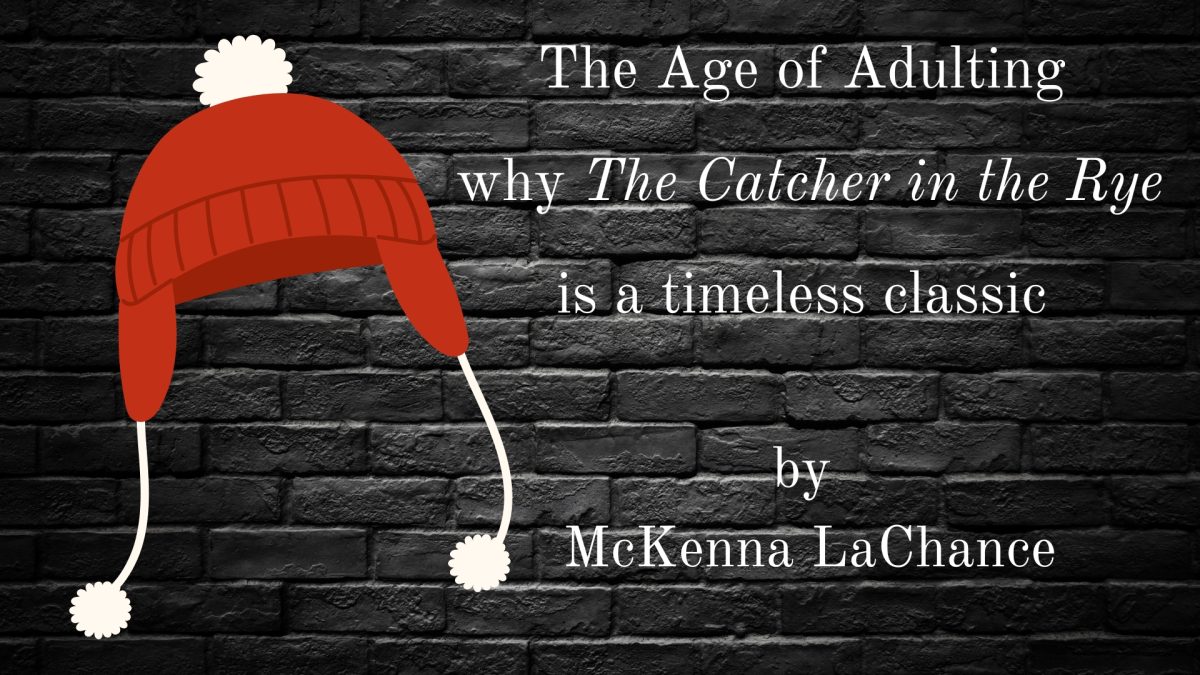Have you ever wondered why your teenager struggles with getting their homework done or even waking up in the morning to find the motivation to go to school? This may be because your teen looks at the world through a different lens than you do. The Catcher in the Rye, a book written by J.D. Salinger, tells the story of a 17-year-old boy named Holden who hates school and thinks that school and society is full of “phoniness” shows how the mind of teenagers works differently than adults.
Teenagers and adults alike should read The Catcher in the Rye because it is a great coming of age book that shows the struggles of a teenager’s mind as he explores society after he gets kicked out of school again. The Catcher in the Rye explores many different coming of age themes that teenagers can relate to. For example, one theme teens may be able to relate to is the loss of innocence or the fear of being an adult. Holden fears getting older and becoming an adult, “[he] acts quite young for [his] age sometimes…and sometimes [he] acts like [he’s] about 13” when in reality he is 17 years old (Salinger 9).
J.D Salinger uses Holden’s character to tell the story of a boy who struggles with his relationships with his parents, other people, and society. Like most teenagers Holden hates school and he hates his teachers. Mr. Spencer, Holden’s history teacher and favorite teacher, asks Holden, “[h]ow many subjects did you carry this term?” Holden took five classes. Mr. Spencer then asks “… how many are you failing…?” Holden tells Mr. Spencer that he is failing all of his classes except English because he already did some of the curriculum at one of his previous schools (Salinger 10).
Teenagers can relate to how Holden feels about being kicked out of school and how he feels about trying to hide the fact that he got kicked out of school again from his parents. Like most children Holden is scared of the consequences of being kicked out of school let alone the fact that Holden has been kicked out of more than one school. Like many teenagers’ parents, Holden’s are more concerned with their image rather than how their children feel and how their children are doing. Holden got kicked out of Pencey Prep, his high school, days before winter break and days before he could go home. Since Holden was trying to hide the fact that he got kicked out of school from his parents he goes to the only person he thought he could go to, his history teacher, Mr. Spencer. While at Mr Spencer’s home Holden experiences what it is like to misplace your trust, another aspect that comes with the reality of adulting. Holden experiences this a few times throughout the book and learns that you can’t always trust everyone you meet.
Mr Spencer asked Holden, “[d]o you feel absolutely no concern for your future, boy?” Holden thought about that, then said, “[o]h I feel some concern for my future alright. Sure. Sure I do… [b]ut not too much, I guess.” Mr. Spencer then adds, “[y]ou will, you will, boy. You will when it’s too late,” but Holden “didn’t like hearing him say that” (Salinger 14). This conversation highlights Holden’s fears of growing up and continuing his life into adulthood. Many adults and teens could relate to this quote because, like Holden, they either didn’t know what they wanted for their future or they still don’t. Deciding your future is a scary and tedious thing that doesn’t always work out the way that someone wants to; or it does – and by the time you realize that the result wasn’t what you really wanted, it may be too late. For this exact reason it may be scary to some people to decide their future at a young age or on their own.
Another student who has read this book is Emily Heinemeyer. She liked the book and found it very interesting. She found “the way his mind would work and the way he would do adult things and then back out of doing those adult things because he was scared” the most interesting part of the book. Emily explained that she could relate to the book because she, like Holden, has backed out of doing adult things when she was scared of growing up and becoming an adult.
Anyone can read this book, whether it be adults, teens, or young adults on the verge of adulthood. There is something to be learned from every book, but The Catcher in the Rye is a book with many lessons and many different themes that can be taken many different ways, by many different people. Though Salinger wrote Catcher in the Rye about a teenage boy who got kicked out of school and spent a few days exploring New York before he goes home to his penthouse where he lives, it was really written about Salinger’s experiences during World War II and his experiences after the war as well. What makes this story timeless is Salinger’s ability to create relatable, unforgettable characters.

